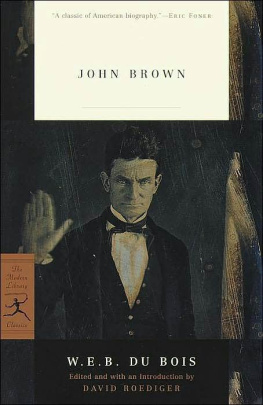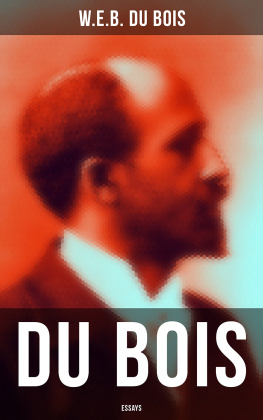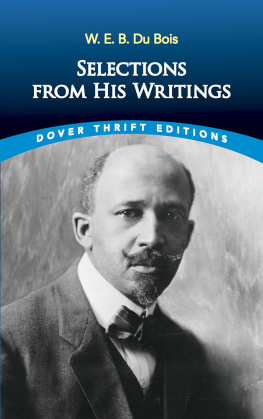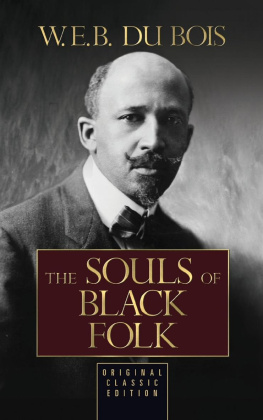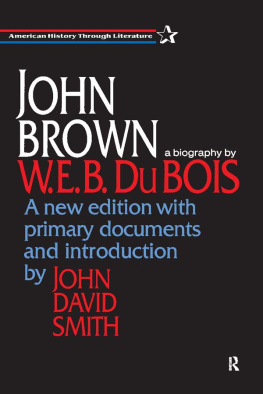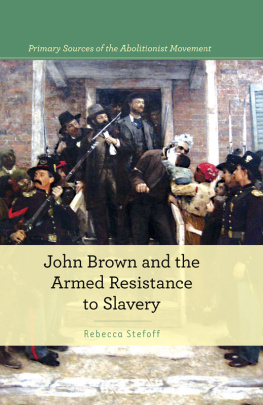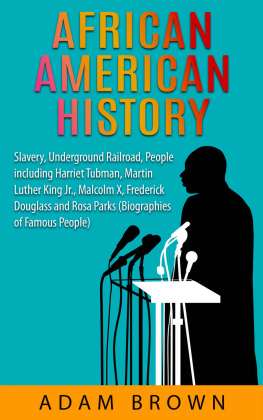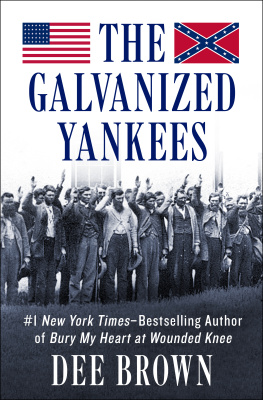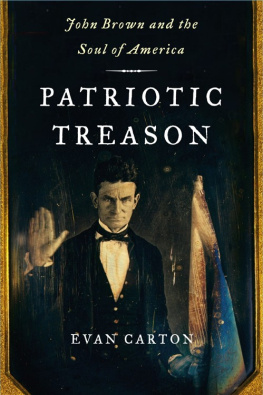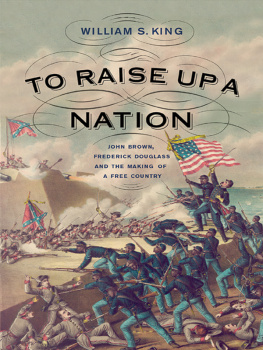W.E.B. Du Bois - John Brown
Here you can read online W.E.B. Du Bois - John Brown full text of the book (entire story) in english for free. Download pdf and epub, get meaning, cover and reviews about this ebook. year: 2001, publisher: Modern Library, genre: Detective and thriller. Description of the work, (preface) as well as reviews are available. Best literature library LitArk.com created for fans of good reading and offers a wide selection of genres:
Romance novel
Science fiction
Adventure
Detective
Science
History
Home and family
Prose
Art
Politics
Computer
Non-fiction
Religion
Business
Children
Humor
Choose a favorite category and find really read worthwhile books. Enjoy immersion in the world of imagination, feel the emotions of the characters or learn something new for yourself, make an fascinating discovery.
- Book:John Brown
- Author:
- Publisher:Modern Library
- Genre:
- Year:2001
- Rating:4 / 5
- Favourites:Add to favourites
- Your mark:
- 80
- 1
- 2
- 3
- 4
- 5
John Brown: summary, description and annotation
We offer to read an annotation, description, summary or preface (depends on what the author of the book "John Brown" wrote himself). If you haven't found the necessary information about the book — write in the comments, we will try to find it.
In the history of slavery and its legacy, John Brown looms large as a hero whose deeds partly precipitated the Civil War. As Frederick Douglass wrote: When John Brown stretched forth his arm ... the clash of arms was at hand. DuBoiss biography brings Brown stirringly to life and is a neglected classic.
John Brown — read online for free the complete book (whole text) full work
Below is the text of the book, divided by pages. System saving the place of the last page read, allows you to conveniently read the book "John Brown" online for free, without having to search again every time where you left off. Put a bookmark, and you can go to the page where you finished reading at any time.
Font size:
Interval:
Bookmark:

William Edward Burghardt Du Boissociologist, historian, educator, journalist, and civil rights activistwas born on February 23, 1868, in Great Barrington, Massachusetts. He was the only child of Mary Burghardt, a proud woman of Dutch-African stock, and Alfred Du Bois, a French Huguenot. Du Bois experienced relatively little discrimination growing up as one of the few blacks in Great Barrington. His first exposure to segregation and the realities of race in America occurred in Nashville where he was a student at Fisk University. In 1888, Du Bois entered Harvard, earning both a B.A. in philosophy and an M.A. in history. Afterward he attended the University of Berlin, and in 1896, following a brief teaching assignment at Wilberforce University in Ohio, he became the first black to receive a Ph.D. from Harvard. The Suppression of the African Slave Trade to the United States of America, 16381870, Du Boiss doctoral thesis, was published in 1896. It lead directly to a position at the University of Pennsylvania; there he compiled research for The Philadelphia Negro: A Social Study (1899). In 1897, Du Bois was named professor of economics and history at Atlanta University, where he taught for the next thirteen years. The Souls of Black Folk brought Du Bois to national prominence when it appeared in 1903; at the time the book was especially noteworthy for its criticism of Booker T. Washington, then the undisputed leader of African Americans.
In 1909 Du Bois helped establish the National Association for the Advancement of Colored People. He was appointed director of research and editor of The Crisis, a monthly magazine that became a forum for confronting the racial prejudice in American society.
Du Bois also lectured widely in the United States and abroad, educating a whole generation of blacks in the art of protest and wrote a number of booksincluding The Quest of the Silver Fleece (1911), The Negro (1915), Darkwater (1920), The Gift of Black Folk (1924), and Dark Princess (1928).
Du Bois broke with the NAACP over questions of ideology in 1934, and for the next ten years he taught at Atlanta once more. Resuming the role of dispassionate scholar, he wrote Black Reconstruction (1935), Black Folk, Then and Now (1939), Dusk of Dawn (1940), and Encyclopedia of the Negro (1945). He also founded Phylon, a quarterly journal addressing world race problems, published by Atlanta University.
In 1944, Du Bois resigned from teaching and returned to the NAACP. The next year he acted as a special consultant to the American delegation at the conference drafting the United Nations Charter. Color and Democracy: Colonies and Peace (1945) presents his views at the time on colonialism in Africa and beyond. After another clash with the NAACP over ideology, Du Bois left the association for good in 1948.
He later served as head of the newly formed Council on African Affairs, a group listed as subversive by the Department of Justice. In 1950, he made a failed bid for the United States Senate as a candidate of the American Labor Party. Du Boiss controversial left-wing opinions steadily eroded his influence. In 1951, at the height of the McCarthy era, he was indicted for involvement with a dissident organization called the Peace Information Center; he was charged with being an unregistered agent for a foreign power. Although he was acquitted, the experience disillusioned Du Bois with American democracy. He recalled his arraignment and trial in the book In Battle for Peace (1952) and paid tribute to the communists of the world for their help in my defense. During 1958 and 1959 Du Bois traveled extensively in the Soviet Union, where he was awarded the International Lenin Peace Prize, and the Peoples Republic of China, where he was honored by Mao Zedong and Zhou Enlai. Shortly after applying to join the Communist Party in 1961, Du Bois emigrated to Ghana at the invitation of Prime Minister Kwame Nkrumah to direct publication of Encyclopedia Africana. W.E.B. Du Bois died as a citizen of Ghana on August 27, 1963, on the eve of the civil rights march on Washington. His last book, The Autobiography of W.E.B. Du Bois, was brought out posthumously in 1968.
David Roediger
In 1938, W.E.B. Du Bois remembered the years during which he wrote John Brown as a period of deep personal transformation. He specifically recalled 1906, when his growing political activism had led him to Harpers Ferry, the scene of John Browns raid. Members of the Niagara Movement, a recently formed African American group planning civil rights protests, had gathered there. According to Du Bois, they made pilgrimage at dawn barefooted to the scene of Browns martyrdom [and] talked some of the plainest English that had been given voice by black men in America.
Du Bois stood as day dawned in Harpers Ferry as both a militant pilgrim and as Browns academic biographer. This two-ness summed up broader change and tension in his life. A Harvard-trained historian and sociologist, by then in his late thirties, Du Bois was torn between what might now be called advocacy and scholarship. Du Boiss own terminology had a different ring: After that [Harpers Ferry] pilgrimage, the fat was in the fire and my career as a scientist was beginning to be swallowed up in my role as propagandist. This was not at all to my liking. As the Niagara Movement waned and then practically became merged with the new interracial agitation that coalesced as the National Association for the Advancement of Colored People (NAACP), Du Bois continued to be swept up in this current to a new and different mode of expression. Just as insistently, as he later put it, I continued to cling to my scientific work. That a book of the stature of John Brown came out of this maelstrom suggests that, at least in the case of Du Bois, the tension between the activist and the academic impulse can be a creative one. Indeed, rehearsing the uncanny ways in which the publishing history of John Brown was interwoven with its authors political, personal, and professional transformations gives us access to the ways in which circumstance and movement inform genius, and vice versa.
The request that Du Bois contribute a volume to the American Crisis Biographies Series came in a November 1903 letter from the historian Ellis Paxson Oberholtzer, who edited the series for George W. Jacobs and Company. Oberholtzer outlined the projects plans for twenty-five biographies of Civil Warera figures. From the start he invoked objectivity and viewpoint in curious juxtaposition. Motivating the series was a desire to let writers born after the war look calmly and dispassionately at the issue and see both sides without the prejudices of War Time. But this objectivity was to be strangely assured. The ten projected volumes on white Southernerstwo on African Americans were foreseenwould be written by white Southern writers as a guaranty of greater impartiality. In commissioning a work from Du Bois, an African American scholars perspective (your view) was clearly being sought. For good measure, oberholtzer credentialed himself as descended from a principal Pennsylvania Station keeper of the Underground Railroad, which had hidden and transported fugitive slaves. Oberholtzer, a University of Pennsylvania Ph.D., praised the Atlanta University-based Du Bois for his very good work in the historical field from the time when you were in Philadelphia. The meticulous research of Du Bois had appeared in print in
Font size:
Interval:
Bookmark:
Similar books «John Brown»
Look at similar books to John Brown. We have selected literature similar in name and meaning in the hope of providing readers with more options to find new, interesting, not yet read works.
Discussion, reviews of the book John Brown and just readers' own opinions. Leave your comments, write what you think about the work, its meaning or the main characters. Specify what exactly you liked and what you didn't like, and why you think so.

